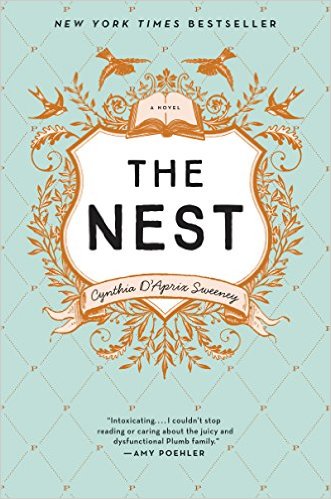What does money do to relationships, and what happens to our ambitions over the course of time? While the Plumb siblings are trying to use the inheritance left from their father to solve their self-inflicted problems, this tender and entertaining debut explores the power of family, the possibilities of friendship, the ways we depend upon one another and the ways we let one another down. – HarperCollins Canada
The Nest, a debut that has become an instant bestseller – I can see Sweeney’s ambition in this novel, and I am impressed by her confidence and composure exhibited throughout this novel. In my opinion, this debut has not only offered captivating narratives but also demonstrated power and depth.
I admire Sweeny’s skillful maneuver of the English language. The engrossing narratives are presented in vignette sort of style, rapidly moving from one scene to another, producing a cinematic trailer of the New Yorkers’ colourful life. Or you can say Sweeney is trying to weave an impressively complex tapestry about New Yorkers’ lives. Many characters are involved in this book and they all have different professions, marital statuses and personalities. You will find some of these characters intersecting each other in certain points of their life paths, but some others simply passing by each other on two parallel tracks. On top of the most important theme about inheritance and how money affects our relationships, various timely topics have been explored in this book, such as gay and lesbian, the aftermath effect of September 11, and even the use of the smart phone technology. At times dark and comical, this novel is full of sharp observations and brave comments that detect the subtlest nuances, for example, Stephanie’s equal desire for solitude and Leo, and Bea’s unaccomplished feeling towards her career while she’s eavesdropping the previous Glittery Girls’ gossip.
I did occasionally find it slightly frustrating when the scenes jumped too fast and the story got too choppy, however, the outcome of this approach is actually an even more realistic story and setting – New York is indeed a vast, dynamic and complicated city, so as its people’s lives.
I must point out what I appreciate the most from this book is the powerful message that Sweeney tries to deliver closer to the end of the book. Our flawed characters in this book don’t seem to be appealing, but under their resentful surface, they demonstrated the most humane side of themselves when they started to see everyone in the family gradually falling apart – they finally came together to support each other as a family and presented to the readers the most heartwarming moments. However, Sweeney didn’t attempt to paint this imperfect world into a perfect one with illusion. The ending and the choice made by our most charismatic character, Leo, is indeed thought provoking.
Lastly, I would like to take this opportunity to draw your attention to an equally comical and thought provoking title Mount Pleasant by Don Gillmor – it’s also about inheritance and family, but sets in Toronto.
Some discussion questions from LitLovers:
- Just how dysfunctional is the Plumb family…and why? Why do the siblings allow Leo to have such power over them? If you could advise any or all four of them, how would you counsel them about living their lives?
- Melody, Beatrice, Jack and Leo all have behaved somewhat (or very) irresponsibly. Is there one of them with whom you sympathize more than the others? Or are they all caught up in a sense of their own entitlement? What about the secondary characters and the roles they play in the story: the grandchildren, Jack’s husband, Melody’s husband, Leo’s girlfriend, and Bea’s boss.
- Ultimately, this book is about defining ourselves as individuals within a family (or even a career). How does each character learn who he or she is and what ultimately makes for a fulfilling life?



